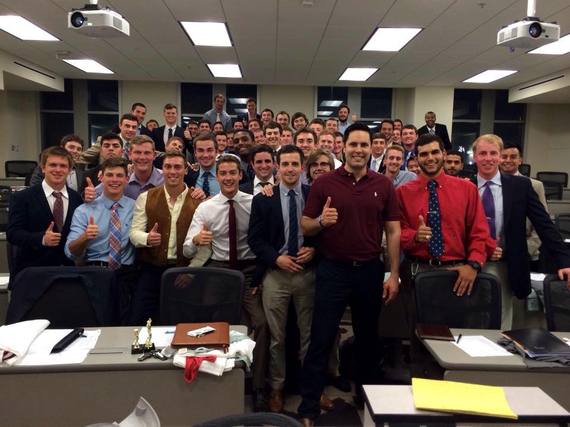I recently spoke to One Army, a young men's college organization at Texas A&M University, about what's wrongly considered strictly an "old man's disease" and how I use leadership to make a difference through a nonprofit I founded after being diagnosed with prostate cancer at age 35.
Anyone can make a difference in our world. The young men of One Army are already engaged in service. And everyone has their reasons for serving others.
Sometimes it's tragedy, loss or pain, and we use that pain to impact the lives of others. That was my motivation.
So I was grateful to speak to this group about men's health issues, and becoming more educated on prostate and testicular cancers, reducing risks of developing chronic diseases and reducing overall cancer risk.
We must do more to reach a younger generation -- to educate and empower by planting seeds early in life on prevention, risk reduction and modifying unhealthy behavioral habits. We must remove the stigma and embarrassment for men to discuss their health issues and help them to become more proactive.
According to the American Cancer Society, 1 out of 2 men and 1 out of 3 women are diagnosed with cancer. But more than half of cancers are preventable, with only 1 in 10 inherited, and the other 9 out of 10 due to some kind of environmental exposure.
After reflecting on years of unhealthy lifestyle habits and my own lack of knowledge about harmful chemical exposure, I wrote Prostate Cancer Prevention Begins When Men are Boys. Read it if you get a second -- and I encourage you to watch this short clip of Dr. Surena Matin, Professor of Urology at MD Anderson Cancer Center, on reducing prostate cancer risk by engaging in healthy lifestyle habits at a much younger age.
When I was in college I did what most college students do. I drank, partied, ate cheap fast food, and lived my college years with little regard for my future health. Planting seeds of knowledge with college students (and younger) is essential in our ongoing War on Cancer.
We shouldn't ask young men and women to serve solely as fundraisers without educating them on what they can do to reduce cancer risk, and encouraging them to learn about cancer-causing chemical exposure in the air they breathe, food they eat and personal care products they use.
After speaking to young men and women while running a cancer nonprofit, it's become clear, that if more knew they could fight cancer, before it strikes, they would do it.
Let's educate and empower our leaders of tomorrow by placing a greater focus on the causes of cancer and risk reduction -- now -- and not wait for what is certainly not just an old person's disease.
